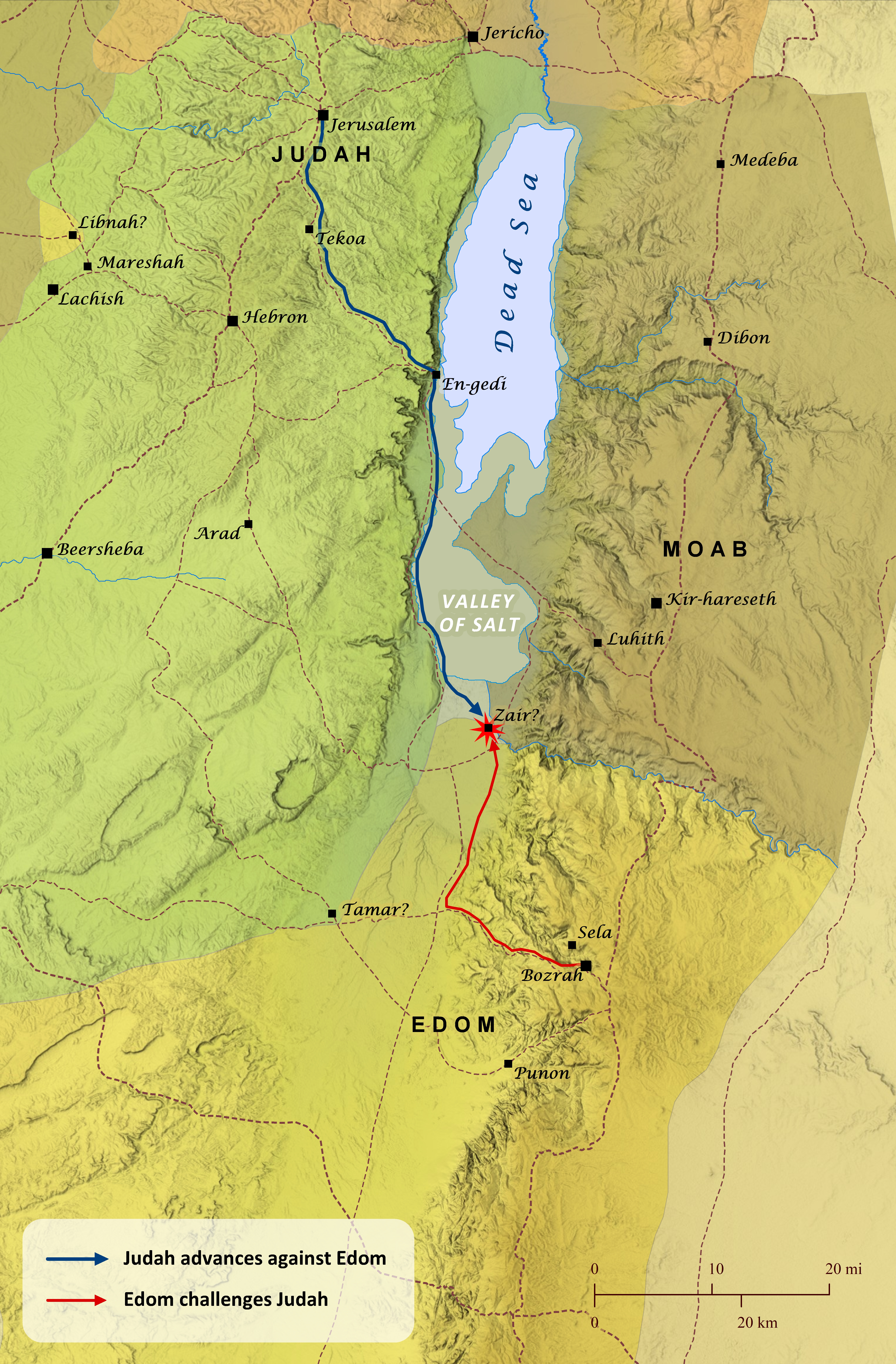Readers’ Version
Literal Version
21 Then Yehoshafat died and was buried with his ancestors in ‘The City of David’, and his son Yehoram (Jehoram) replaced him as king.
2 Yehoram’s younger brothers were Azaryah, Yehiel, Zekaryah, Azaryah, Mikael, and Shefatyah, 3 and their father gave them many gifts of gold and silver and precious things, along with fortified cities in Yehudah, however he handed the kingdom over to Yehoram because he was the oldest son. 4 After Yehoram established firm control of his father’s kingdom, he had all his brothers killed, as well as some of Yisrael’s leaders.
5 Yehoram was thirty-two years old when he became the king, and he ruled from Yerushalem for eight years. 6 He did many of the evil things that Yisrael’s kings had done, because he married one of King Ahav’s daughters and did things that Yahweh had said were evil. 7 Despite that, Yahweh wouldn’t eliminate David’s descendants because of the promise he’d made with David to ‘keep his lamp burning’ forever.[ref]
8 Meanwhile, Edom had been under Yehudah’s control, but during Yehoram’s reign they rebelled and appointed their own king.[ref] 9 Yehoram took his commanders and all his chariots, and crossed the Yorden River, then at nighttime he attacked the Edomites who had surrounded him and his chariots.[fn] 10 However, Edom successfully rebelled against control by Yehudah, then Livnah also did the same, because Yehoram had abandoned Yahweh, the god of his ancestors. 11 Also he built hilltop shrines around Yehudah, and he caused Yerushalem’s inhabitants to prostitute themselves,[fn] and he drove Yehudah away from Yahweh.
12 Then King Yehoram received a written message from the prophet Eliyah (Elijah): “Your father David’s god Yahweh says that because you decided not to follow the ways of your father Yehoshafat or those of good King Asa, 13 but rather you imitated the behaviour of Yisrael’s king, then you’ve caused Yerushalem’s inhabits as well as wider Yehudah to commit adultery like Ahab’s family did. Also, you’ve killed your own blood brothers—people who were better than you. 14 So listen, now Yahweh is going to severely strike your people including your sons and your wives, as well as all your possessions, 15 and you yourself will get an intestinal disease that will get worse every day until your innids fall out.”
16 Then Yahweh stirred the Philistines up against Yehoram, as well as the Arabs who lived beside the Kushites, 17 and they attacked Yehudah. They did a lot of damage and took away everything valuable from the king’s palace. They also took his wives and sons, other than Yehoahaz, his youngest son.
18 After that, Yahweh caused an intestinal disease in Yehoram that couldn’t be cured, 19 and it progressed day after day until after two years, his intestines fell out and he died in great pain. His people didn’t make a bonfire in his honour like they’d done for his ancestors.
20 Yehoram was thirty-two when he became king, and he ruled from Yerushalem for eight years. No one regretted it when he died, and his body was buried in ‘The City of David’, but not in the royal tombs.
21:9 The meaning of the second half of this sentence is confusing, so other translations might differ.
21:11 This sentence is about worship, not physical adultery, so the reference to prostitution most likely refers to idol worship. Also see verse 13 below.
2 And_to/for_him/it brothers the_sons_of Yəhōshāfāţ ˊAzaryāh and_Yəḩīʼēl/(Yəˊīʼēl/(Jehiel)) and_Zəkaryāh and_ˊAzaryāh and_Mīkāʼēl and_Shəfaţyāh all_of these were_the_sons_of Yəhōshāfāţ the_king_of Yisrāʼēl/(Israel).
3 And_he/it_gave to/for_them father_of_their gifts many of_silver and_of_gold and_of_valuable_possessions with cities_of fortifications in/on/at/with_Yəhūdāh and_DOM the_kingdom he_gave to_Yəhōrām if/because he the_firstborn.
4 and_ Yəhōrām _he/it_rose_up over the_kingdom_of his/its_father and_strengthened and_killed DOM all_of brothers_of_his in/on/at/with_sword and_also some_of_princes_of Yisrāʼēl/(Israel).
5 was_a_son_of thirty and_two year[s] Yəhōrām in/on/at/with_became_king_he and_eight years he_reigned in/on/at/with_Yərūshālam/(Jerusalem).
6 And_he/it_went in/on/at/with_way_of the_kings_of Yisrāʼēl/(Israel) just_as they_had_done the_house_of ʼAḩʼāⱱ if/because the_daughter_of ʼAḩʼāⱱ she_was for_him/it wife and_he/it_made the_evil in/on_both_eyes_of YHWH.
7 And_not he_was_willing YHWH to_destroy DOM the_house_of Dāvid on_account_of the_covenant which he_had_made with_Dāvid and_as_which he_had_said to_give to_him/it a_lamp and_to_descendants_of_his all_of the_days.
8 In/on/at/with_days_of_his ʼEdōm it_rebelled from_under the_hand_of Yəhūdāh/(Judah) and_they_set_king of_their_own a_king.
9 And_ Yəhōrām/(Jehoram) _crossed_over with commanders_of_his and_all the_chariots with_him/it and_he/it_was he_arose night and_struck DOM ʼEdōm the_(one)_going_around to_him/it and_DOM the_commanders_of the_chariot.
10 And_ ʼEdōm _revolted from_under the_hand_of Yəhūdāh until the_day the_this then Liⱱnāh it_rebelled in/on/at/with_time the_that from_under his/its_hand if/because he_had_abandoned DOM YHWH the_god_of ancestors_of_his.
11 Also he he_made high_places in/on/at/with_hill_country_of Yəhūdāh and_led_into_unfaithfulness DOM the_inhabitants_of Yərūshālam/(Jerusalem) and_led_astray DOM Yəhūdāh.
12 and_came to_him/it a_writing from_ʼĒliyyāh the_prophet to_say thus YHWH he_says the_god_of Dāvid I_will_show_you(ms) because that not you_have_walked in/on/at/with_ways_of Yəhōshāfāţ/(Jehoshaphat) I_will_show_you(ms) and_in/on/at/with_ways_of ʼĀşāʼ the_king_of Yəhūdāh.
13 And_walked in/on/at/with_way_of the_kings_of Yisrāʼēl/(Israel) and_led_into_unfaithfulness DOM Yəhūdāh and_DOM the_inhabitants_of Yərūshālam/(Jerusalem) as_led_into_unfaithfulness the_house_of ʼAḩʼāⱱ and_also DOM brothers_of_your the_house_of I_will_show_you(ms) the_better than_you you_killed.
14 Here YHWH is_about_to_strike a_blow great in/on/at/with_people_of_your and_in/on/at/with_sons_of_your and_in/on/at/with_wives_of_your and_on/over_all possessions_of_your.
15 And_you(ms) in/on/at/with_sickness great in/on/at/with_disease_of bowels_of_your until they_will_come_out bowels_of_your from the_disease days to days.
16 And_ YHWH _stirred_up on Yəhōrām/(Jehoram) DOM the_spirit_of the_Fəlishtiy and_the_ˊArāⱱī who were_on the_hand_of the_Kūshiy/(Cushi)tes.
17 And_came_up in/on/at/with_Yəhūdāh/(Judah) and_invaded_it and_carried_away DOM all_of the_possessions the_found in_house_of the_king and_also sons_of_his and_wives_of_his and_not he_remained to_him/it a_son if/because (if) Yəhōʼāḩāz/(Jehoahaz) the_young_one_of son_of_his.
18 And_after all_of this afflicted_him YHWH in/on/at/with_bowels_of_his with_disease for_no healing.
19 And_he/it_was in_course_of_day from_days and_in_the_course_of_time_of was_going_out the_end of_years two bowels_of_his they_came_out with disease_of_his and_he/it_died in/on/at/with_agony harmful and_not they_made to_him/it people_of_his a_burning like_fire_of fathers_of_his.
20 A_son_of thirty and_two he_was in/on/at/with_became_king_he and_eight years he_reigned in/on/at/with_Yərūshālam/(Jerusalem) and_he/it_went in/on/at/with_no desire and_buried_him in/on/at/with_city_of Dāvid and_not in/on/at/with_tombs_of the_kings.

